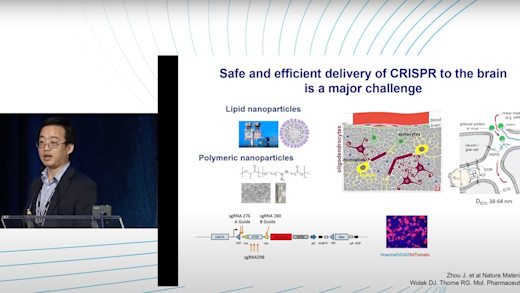For Donors
NIH Grant 2023
The two diseases being targeted in the project are Angelman syndrome and H1-4 (HIST1H1E) syndrome. The project team named under the grant includes representatives from Dr. Yong-Hui Jiang’s team and Dr. Jiangbing Zhou’s team at Yale, Dr. Elizabeth Berry-Kravis’ team at RUSH, and Dr. Allyson Berent and Jennifer Panagoulias from the Foundation for Angelman Syndrome Therapeutics (FAST).
The grant, from the NIH Common Fund, is part of a two-phase program with a total proposed budget of approximately $40 million in 5 years. The first phase, worth $26.5 million, is dedicated to generating all preclinical data and other key components towards a clinical trial for both diseases. The second phase, worth approximately $13.4 million, is intended to fund the Phase 1/2 clinical trial itself. The award of this second phase is contingent upon successful completion of the first phase.
Altogether the grant supports the entire trajectory of drug development — from the proof-of-concept studies through to the IND-enabling studies required for a clinical trial and the Phase 1/2 clinical trial for both diseases. The new delivery technology — called Stimuli-responsive Traceless Engineering Platform (STEP) — enables brain-wide delivery of ribonucleoproteins (RNPs) via intrathecal administration and has the potential to cure diseases in the brain through a one-time treatment. The technology was developed and characterized by the team jointly led by Drs. Jiang and Zhou.
The new delivery technology — called Stimuli-responsive Traceless Engineering Platform (STEP) — enables brain-wide delivery of ribonucleoproteins (RNPs) via intrathecal administration and has the potential to cure diseases in the brain through a one-time treatment. The technology was developed and characterized by the team jointly led by Drs. Jiang and Zhou.
“As a versatile platform technology, STEP-engineered RNPs could be potentially adopted for treatment of many neurogenetic disorders” said Dr. Jiangbing Zhou.
For Angelman syndrome, the results to date are showing substantial promise in the mouse model at both birth and adult ages, with wide brain biodistribution and a long-lasting effect. Importantly, the gene editing platform avoids the need for viral delivery, which is the common way that CRISPR technologies have been delivered to the brain. The FAST Team, led by Dr. Allyson Berent and Jennifer Panagoulias, will be supporting the IND-enabling studies and regulatory strategy required to bring this technology to AS patients. Early pre-clinical data for H1-4 also appear promising.
“In our mouse model of Angelman syndrome, we’re seeing very efficient gene-editing in neurons throughout the brain accompanied by reactivation of the Ube3a gene and improvements in neurobehavioral phenotypes,” said Dr. Yong-Hui Jiang. “It’s astonishing.
Providing successful milestones are met, human clinical trials of this program will run both at Yale and at the Rush F.A.S.T. Center for Translational Research, a first-of-its-kind center established last year via a $5 million gift from the patient advocacy group. The RUSH FAST team will also be working to increase access to these therapies while bringing to bear its extensive experience in designing and enacting clinical trials.
“This is the reason the RUSH F.A.S.T Center for Translational Research was established: to be able to run novel, innovative and potentially transformative clinical trials for Angelman syndrome,” said Dr. Elizabeth Berry-Kravis, MD, PhD, professor of pediatrics and neurological sciences and director of the RUSH Pediatric Neurosciences F.A.S.T. Center for Translational Research at RUSH University in Chicago. “This program is the perfect fit, as we work hard to train more physicians globally to understand how to most effectively bring these types of therapies to the greatest number of patients.”
This new grant supports the translation of promising technologies from the laboratory into the clinic, where it can directly benefit patients — known as “bench to bedside” — which is the hallmark of FAST's unique patient advocacy strategy. The group, the largest funder of Angelman syndrome research in the world, is dedicated to bringing effective treatment into current medical practice.
“This grant supports a complete bench-to-bedside arc,” said Dr. Allyson Berent, chief science officer at FAST. “It not only pushes forward the scientific promise already proven in the rodent model, but provides the resources for our team to advance the program through the regulatory requirements needed to get this into a first-in-human clinical trial. It’s an innovative way of fulfilling our mission at FAST: managing and protecting the therapeutic pipeline so that treatments can get to people living with Angelman syndrome as quickly and safely as possible.”
Other faculty participants for the projects from Yale school of medicine include James McPartland, PhD; Julie Wolf, PhD; Michele Spencer-Manzon, MD; Hui Zhang, MD, PhD; Caroline Hendry, PhD; James Dziura, PhD, MPH; Nigel Bamford, MD; Kathleen Cardinale, MD; Caihong Qiu, PhD; and Eric Velazquez, MD.
